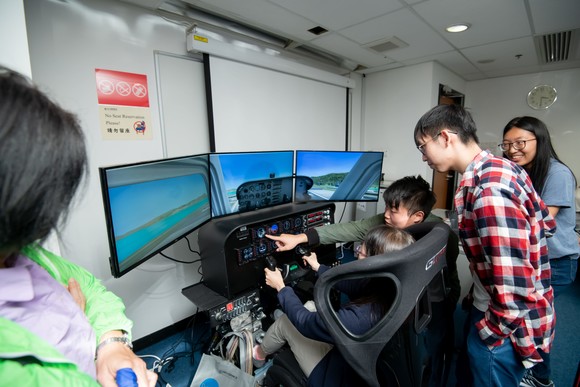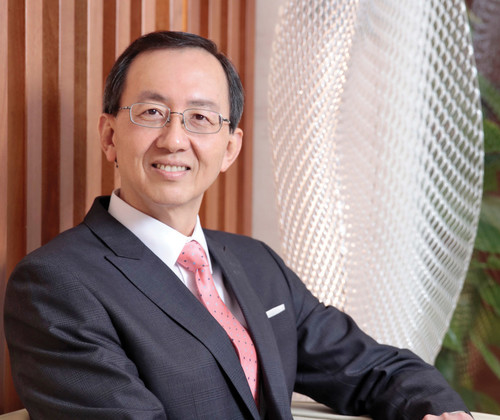Life at HKU SPACE Our Stories
The evolution of teaching and learning – see you online!Feature Story
- Date
- 23 Jul 2020 (Thu)
2020 has been a year full of changes. The pandemic propelled various sectors onto the path of reform, to remain ahead of the curve in a competitive environment. The education sector from primary, secondary through to tertiary education, including HKU SPACE, also reacted swiftly to the recent class closures, moving their classrooms to the boundless online world, realising the vision of online education for all.
Multi-faceted model of education made possible via technological progress
HKU SPACE is committed to investing in and utilising advanced technology as well as available learning resources to promote innovative and creative teaching pedagogies for the enhancement of learning experiences. Professor William K.M. Lee, Director of HKU SPACE, said, “With technology advancing rapidly, activities online have become a new normal; knowledge no longer lives exclusively in books, and learning is no longer confined within the classroom. We firmly believe that online education platforms that break geographical boundaries, with the introduction of education and supporting materials utilising advanced technology, possess the power to inspire creative teaching, which in turn increases the effectiveness of learning.”
We aim to enhance quality teaching and learning through offering more blended courses that combine online and face-to-face teaching in future, and even provide full online courses in times of crisis as part of our standard offering. As well as catering to students who cannot attend the classes in person due to personal and other reasons, we also aim to provide lifelong learning opportunities for the One Belt One Road countries in the long run,” he added.
An education blueprint that embraces technology
In order to achieve this goal, HKU SPACE has established a new Advisory Committee on Innovation and Technology, which offers IT-related advice for instructors on course design. A number of initiatives on e-learning development have been launched. Our first MOOC (Massive Open Online Course), “Buddhism: Diamond Sutra and World Peace”, was launched in 2018 followed by “Buddhism: Diamond Sutra and Zen Meditation” in 2019 to widespread acclaim, allowing students around the world to freely access curriculum resources worldwide. Career SPACE, a one-stop online career platform for students and alumni, was launched in early 2019, marking an important milestone for our development.
Besides, the School has instilled various elements of technology in both new and existing courses, through a range of tools including virtual classroom, Webinar, online learning platform SOUL, visual communication tool Zoom and video-sharing platform Vimeo, to enrich our students’ learning experience and to teach in an interactive manner. Currently, VR, AR and 3D printing have been introduced to various subjects including aviation, dietetics, food & nutrition, library and information studies, marketing, healthcare and pharmaceutical studies. Furthermore, CAVE (Cave Automatic Virtual Environment, offering virtual and augmented reality) allows students students of different disciplines like Architectural Studies, Marketing and Retail Management to explore the world through an interactive learning model. The developments in e-learning strategically demonstrate that HKU SPACE is a successful and premier provider in continuing education and lifelong learning through a flexible and effective approach.
Hybrid learning – the new future of education
Looking ahead, Professor Lee expressed, “As a pioneer of continuing education, HKU SPACE must embrace emerging technology in learning, whilst the development of technology related courses is a key strategy for the School. Towards this goal, we plan to develop our Island South campus into an innovative technology centre that supports VR/CAVE laboratories, aviation laboratories, e-sports arenas, and other related facilities, to meet the needs for technology-intensive disciplines such as aviation, e-sports, geotechnical engineering, data science, and cybersecurity in their development. This will become our TechnoSPACE. Elsewhere, in terms of hardware, we will gradually introduce hybrid classrooms, distance learning classrooms, virtual classrooms and online content creation, in order to meet the needs of the development of digital learning. These facilities will allow simultaneous online transmission by instructors and students from different course groups. By December, there will be over 100 classrooms converted for online delivery to provide high flexibility to learners.”
“As for course offerings, a range of brand new blended courses will be launched in the future. We also put emphasis on the training of both full-time and part-time teachers so that they will be equipped with the necessary skills of e-Learning. And part-time teachers will be given a training subsidy for them to undertake certain training including the techniques of engagement with students during online classes,” said Professor Lee.
“HKU SPACE has been known for its quality programmes and teaching. Our face to face delivery of courses is the gold standard, and as we move to online delivery, this standard must be maintained. To this end our quality assurance mechanisms will adapt to this new delivery mode, so that our students are confident that the online delivery has the quality benchmark as they would expect from a face to face taught course,” he concluded.













